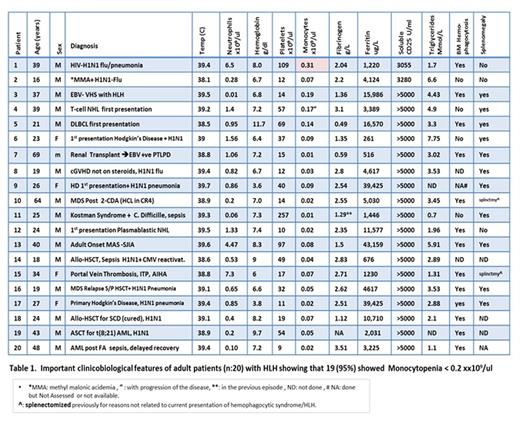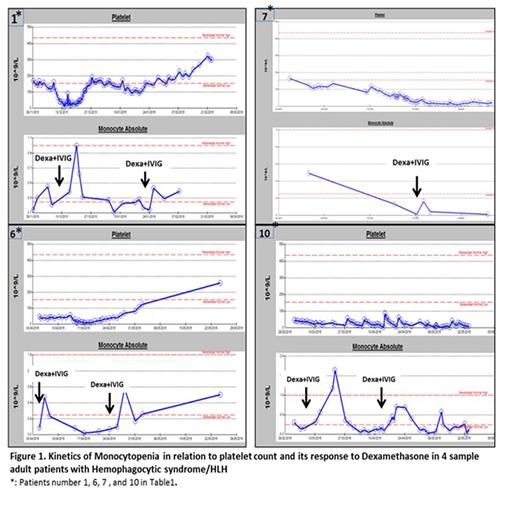Abstract
Background
HLH is an under-estimated and under-reported syndrome with diverse etiologies but can cause life threatening cytopenia (s) and organ failure with very high mortality in critically ill patients. Early diagnosis and management are of paramount importance for better survival. The current HLH 2004 diagnostic criteria are not optimal to achieve such a goal. Monocytopenia is not included in the diagnostic criteria although HLH is associated with activation, mobilization of and shift of monocytes to tissues where phagocytosis occurs.
Hypothesis and Goal
We hypothesized that monocytopenia is expected to occur patho-physiologically in HLH and accompany other cytopenias and treatment should be associated with reversal of monocytopenia in adults with HLH associated with different diseases.
Methods and subjects:
This is a retrospective analysis of 20 consecutive adult patients (>/= 16 years) with complete records diagnosed on in ICU or in-patient hematology consult service at our institution who presented with fever and cytopenia(s) between Dec. 1st and June 30th, 2016. All patients fulfilled at least 5 out of 8 HLH2004-diagnostic criteria and/or had a genetic mutation of Familial HLH.
Results:
A total of 20 patients (3 females) with a median age 27 y (range 16-69) with diverse diagnoses (Table 1):
10 patients had malignancies; the most common (7; 70%) were lymphomas (3 HD, 1 DLBCL, 1 Plasmablastic NHL, 1 T cell NHL and PTLPD). 3 patients had myeloid malignancies (1 MDS, 1 active AML and one after FA salvage for AML), 3 were post allo-HSCT in CR (2 cGVHD; one on Cyclosporine), 1 post-Autologous HSCT for AML in CR, 1 HLH with RAB27 mutation, 1 ITP and AIHA (Evan's) presented with portal and superior mesenteric vein thrombosis, 1 Kostman Syndrome, 1 HIV on HAART therapy, 1 MethylMalonic Acidemia (MMA) and one with Adult Onset MAS -SJIA.
The triggering or Co-triggering factors were considered to be due to H1N1 in 10 (50%) patients (5 with active malignancy) as it is an epidemic in Saudi Arabia since 2009; one with CMV reactivation post Allo-HSCT, EBV in 2 (10%) (1 with PTLPD after renal transplant on CSA and 1 with HLH-RAB27 mutation), , 1 chemotherapy (Fludarabine+ AraC) triggered during extended neutropenia and sepsis, 3 patients (DLBCL, T Cell NHL, HD) presented with malignancies with HLH without known triggering factor except malignancy (Malignancy-triggered HLH). 4 patients had no known triggering factors (T cell -NHL, DLBCL and t- MDS in CR 5 years after 2-CDA therapy for HCL.
All patients fulfilled at least 5 criteria out of 8 according to HLH-94/HLH 2004 guidelines' criteria as shown in table-1 including a patient with HLH with RAB27 mutation
19 (95%) patients developed monocytopenia <0.2 x109/ul; 18 (90%) at the time of fulfilling HLH 2004 criteria and an additional patient with progression of the disease. Monocytopenia was severe (<0.1 x109/ul) in 16 (80%) patients.
Kinetics of Monocytic count in relation to other cytopenias (thrombocytopenia, Neutropenia and anemia): Monocytic count followed the platelet count (and/or neutrophil count) and vice versa and responded promptly to IVIG and Dexamethasone therapy even before significant recovery of the platelet count as shown in the illustrated samples of patients number 1, 6, 7 and 10 in figure 1. Early disease response and recovery (figure 1; patient 1& 6 figure 1) was associated with early monocytes count recovery which may be related to inactivation of macrophages and re-mobilization back from tissue histiocyte/macrophage pool to the circulating pool of monocytes. Those who did not respond to therapy or progressed, showed progressive severe monocytopenia as in figure 1; patient 7 &10.
Discussion and Conclusion:
Monocytopenia was present in nearly all adults presenting with or during the course of untreated hemophagocytic syndrome or HLH of different etiologies and should be further evaluated in a larger cohort as an additional criterion for diagnosing HLH. It responds promptly and earlier than platelets to Dexamethasone and IVIG therapy while progressive severe monocytopenia was associated with progressive disease.
No relevant conflicts of interest to declare.
Author notes
Asterisk with author names denotes non-ASH members.



This feature is available to Subscribers Only
Sign In or Create an Account Close Modal